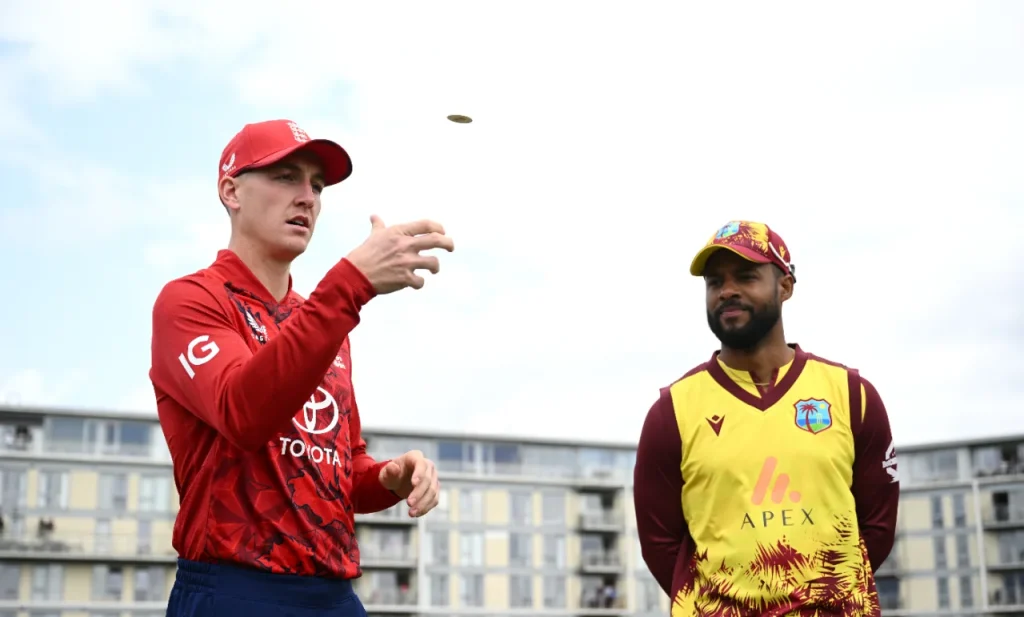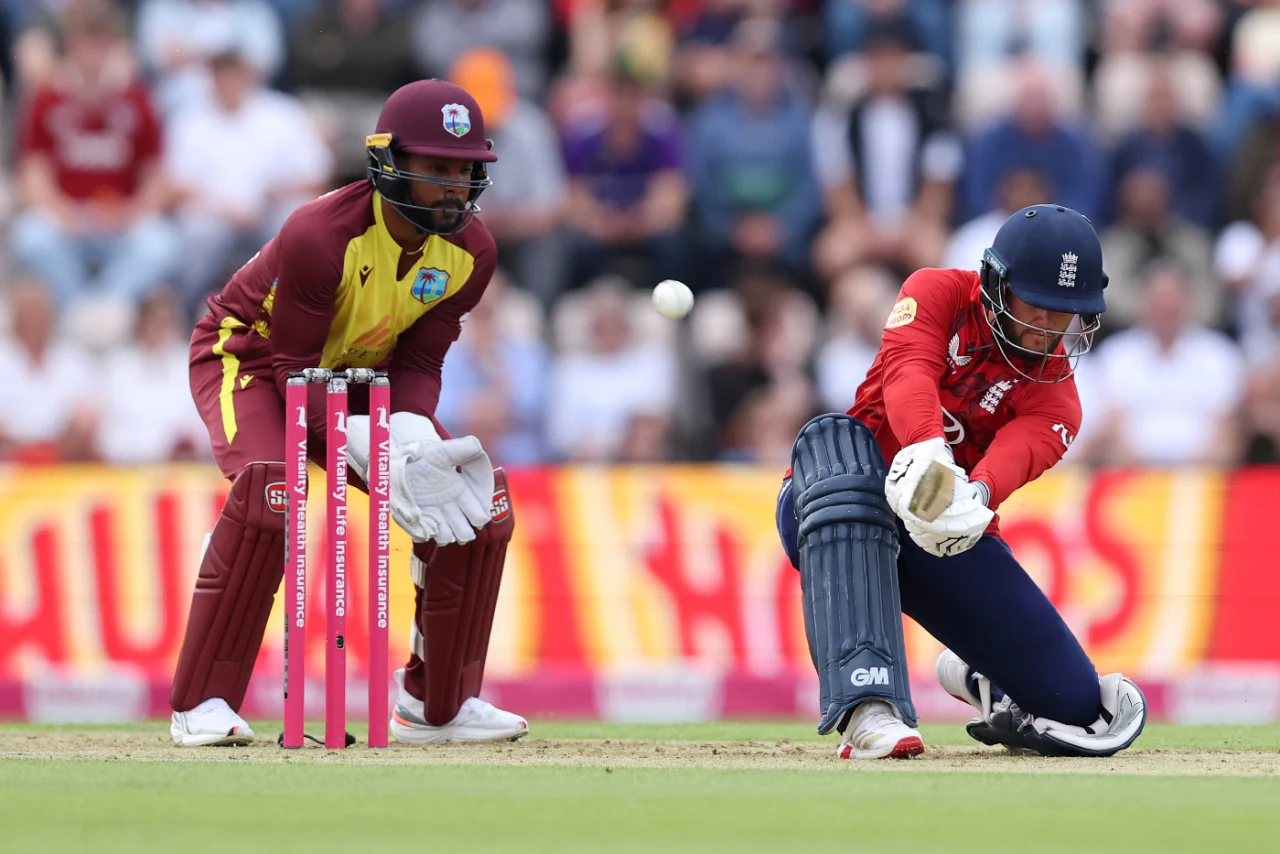England wrapped up a flawless white-ball campaign with a 37-run win in the final T20I at the Utilita Bowl on Tuesday night, sealing a 3-0 series sweep over the West Indies and completing a dominant double across both formats. It marks a dream start to Harry Brook’s captaincy reign, with back-to-back clean sweeps in the ODIs and T20Is — and England’s first three-match or more T20 whitewash since 2021.
The tone was set early in the opener at Chester-Le-Street, where Jos Buttler’s blistering 96 and Liam Dawson’s four-wicket haul powered England to a 21-run victory. Buttler, returning to form in emphatic style, did the bulk of the damage with the bat, easing the pressure on Brook’s first outing as T20I skipper.
In Bristol, Brook got the chase he asked for — and what a chase it turned out to be. West Indies launched a brutal assault late in their innings, smashing 75 off the final four overs. But England, led by Jacob Bethell and Tom Banton’s fearless partnership, overhauled the total to seal the series with a four-wicket win.
The final match in Southampton was a celebration of England’s depth and confidence. Ben Duckett’s 84 and a maiden T20I fifty from Jamie Smith (60) laid the platform with 120 inside the first nine overs. With support from a string of cameos — including an impressive 36 from Jacob Bethell — England posted their second-highest T20I total ever, and their highest on home soil. The West Indies, left chasing shadows, never truly threatened, slumping to a 37-run defeat and handing England a dominant finish.
Player of the Series – Jos Buttler
There’s a reason they call him Jos the Boss. And if there were ever any doubts (there weren’t), England’s white-ball maestro silenced them with another stellar showing, reminding the world exactly why he’s hailed as one of the greatest short-format players on the planet.
Fresh off a sensational IPL stint with the Gujarat Titans, where he racked up 538 runs at a thunderous strike rate of 163.03, Buttler carried that red-hot form straight into England colours. And how. His headline act? A thunderous 96 off 59 balls, the second-highest T20 score of his international career (only topped by his unbeaten 101* against Sri Lanka in the 2021 ICC Men’s T20 World Cup), and his highest on home soil. He had shown glimpses of what he’s capable of in the ODI series, but he came to life in the T20s.
It was vintage Jos: fifty off 25 balls, strike rate north of 200, and a full repertoire of shots that left fielders guessing and bowlers scratching their heads. He went over the top, swept both ways, stepped outside off, scooped (of course), and flicked behind square — all with that trademark Buttler ease and ice-cool composure.
What made it even better for England supporters? That unmistakable smile was back. After the pressures of captaincy weighed heavily during some challenging months, this was a player fully in his element — free-flowing, fearless, and having fun. The Jos we all know and love.
He didn’t just bludgeon the ball; he out-thought the bowlers. At Chester-Le-Street, facing one very big boundary hitting into the wind, Buttler didn’t bother swinging wildly. Instead, he picked his moments perfectly, opting to go straight or execute those jaw-dropping scoops with surgeon-like precision. It was clever, calculated, and completely captivating.
Fresh off his match-winning 96 in the opener, Buttler proved it wasn’t a one-night show. At Bristol, he top-scored again — this time with a measured 47 off 36 — and once more, England turned to their white-ball talisman when early wickets fell.
After Ben Duckett departed early in the first match, it was Jamie Smith’s turn to exit quickly in game two. But cool as ever, Buttler took charge of the chase, showing intent with an imperious straight six over long-on — the kind of shot that says, “Don’t worry, I’ve got this.”
While Duckett provided a zippy 30 off 18 to keep things moving early, it was Jos who anchored the innings in white-ball style. By the end of the powerplay, the pair had steered England to a handy 58-1, laying the platform without letting the rate climb out of control.
When the boundaries dried up approaching the ninth over, it was Jos who broke the shackles, launching a trademark reverse sweep to relieve the pressure. And let’s talk about that scoop: by this point in the series, he’d scored 34 runs via scoops alone, the most he’s ever chalked up using that shot in any T20 series. That’s not just skill — that’s innovation, instinct, and cricketing IQ all rolled into one.
With the asking rate creeping gradually down to 11 and England still needing just under 100, Buttler’s counterattack was in full swing. He looked set to carry the side home again — until he fell, attempting another reverse, caught by the man who’d dropped him moments earlier – Johnson Charles.
Still, this was a knock that radiated leadership and composure. Chasing 197 was never going to be a walk in the park, and while this innings didn’t have the fireworks of his 96, it had something just as valuable: control. Buttler held the chase together with calm authority and paved the way for Bethell and Banton to cut loose.
The third match brought yet another challenge — and a different role for Buttler. With Duckett and Smith putting on a barnstorming 121-run stand, Jos had the rare luxury of time. But he didn’t waste any of it. After easing into his innings with three singles, he made his intentions clear off his fourth delivery: stepping outside off, using Alzarri Joseph’s pace, and shovelling it fine for six. Then came the magic — a piece of signature Buttler innovation, somehow ramping the ball over his own head to third man while looking the other way. Pure box office.
Credit to West Indies skipper Shai Hope for pulling a wildcard — bringing on Sherfane Rutherford, whose lack of pace and wide line did the trick. Buttler, looking to keep the tempo high, couldn’t get enough on an attempted loft over long-off and lost control of the shot (and almost the bat) as he holed out for 22 off 10. This time, it wasn’t about anchoring — it was about impact. And even in a short stay, he struck at 220, keeping England’s foot firmly on the gas.
Across all three games, Jos Buttler reminded everyone — fans, critics, and opponents alike — that when he’s in rhythm, there are few in world cricket who can match his blend of power, finesse, and cricketing smarts. Whether anchoring a chase, launching an all-out assault, or simply lifting the dressing room with that familiar calm presence, Buttler was the heartbeat of England’s T20 campaign. He adapted to every situation, played with freedom, and most importantly, looked like a man enjoying his cricket again. Player of the Series? Absolutely. But more than that, this was a series that marked the full return of Jos the Boss — and just in time for England’s summer charge.
So here’s to Universe Jos — long may he reign. With 165 runs at a strike rate over 150, Buttler is well and truly back to his destructive best, thriving in his new role at number three.

Standout Moment – Luke Wood strikes first ball
Across the three matches, there was no shortage of standout moments. Liam Dawson’s four-wicket haul on his return to England colours in Durham was a timely reminder of his enduring quality. Then came the fireworks from Bethell and Banton — a partnership full of swagger, shot-making, and serious intent. And Smith’s shot of the series? Pure class — front foot outside off, perfectly balanced, launching it high into the extra cover stands in Southampton like he was swatting away a fly. But as electric as those moments were, there was only ever one standout star.
In a series defined by power-hitting, it was a returning left-arm quick, making his first international appearance since September 2023, who truly turned the tide. When asked why Luke Wood got the call-up, Harry Brook said he wanted a “point of difference.” And in conditions tailor-made for him at The County Ground, Wood delivered exactly that.
With a strong crosswind working in his favour, Wood steamed in and produced a dream delivery — full, rapid, tailing in viciously to the toes of Evin Lewis, who could only watch as it clattered into his pads. Umpire Martin Saggers raised the finger instantly, and despite a hopeful review from Lewis (who seemed to think he’d got bat on it), UltraEdge revealed the thump of the bat into the ground. Absolutely plumb.
The left-arm pacer made an immediate impact, joining a rare club of England bowlers to strike with the very first ball of a T20I. Wood became just the third Englishman to take a wicket with the opening delivery of a T20 International, following in the footsteps of Steven Finn and David Willey. An elite way to announce your return.
Wood’s day only got better. He returned to bowl Charles and plucked a sharp, diving catch to remove Rovman Powell, before stepping up to bowl the final over under pressure. Even with Jason Holder going big at the death, Wood finished with an impressive figures of 2-25, showcasing his skiddy pace, late swing, and relentless accuracy. He’s a bustle bowler with a low trajectory, a nasty bouncer, and bags of control — exactly the sort of left-arm option every top white-ball side needs. Maybe, just maybe, he was the missing piece at the Champions Trophy?
His form rolled into the final game too, where he claimed 3-31 — including a bit of tail-end mopping.
The Captain – Harry Brook
This series marked England’s first clean sweep in a three-match (or more) series since 2021 — and while that’s no easy achievement, Brook is making it look like second nature. After an impressive start in the ODIs, Brook’s smooth transition into white-ball captaincy has continued in the T20s, and the early signs are seriously exciting.
What stands out? Brook’s got a clear vision. He wants depth, flexibility, and freedom — especially with the bat. In Bristol, he went in with just two frontline seamers and backed part-time spin options like Will Jacks and Jacob Bethell, much like he did in Cardiff. Even in conditions that weren’t exactly spin-friendly, Brook stuck to his plan and used his bowlers cleverly. He’s building a side where the top order can go full throttle, knowing there’s depth and calm heads behind them.
That faith is infectious. Brook gives players permission to be bold, to play their natural games without fear. You can see it in the way England batted — fearless, creative, and unshackled. His trust in the tail is clear too. Brook’s happy batting all the way down to Adil Rashid, and bringing Liam Dawson back into the mix showed he’s not afraid to roll the dice. Dawson delivered, of course, because that’s what happens when players feel backed.
From the inspired recalls of Dawson and Wood to the smart squad balance and confident tactical calls, Brook isn’t just wearing the armband — he’s already putting his stamp on this team. New opening combinations, managing a thin seam attack, handling unfamiliar venues — Brook took it all in stride and passed the test with flying colours.
A clean sweep. A captain who gets it. And a team playing with freedom and fire. The Brook era is off to a flyer — and long may it continue.

The Opposition – The West Indies
It’s a challenging period for the West Indies, as the Men in Maroon were clean swept by England in both the ODI and T20I series. To add to the difficulty, they were dealt a major blow this week with the surprise retirement of Nicholas Pooran — one of their premier white-ball players — at just 29 years of age.
There’s no denying the talent in this West Indies side. Many of their players are among the most sought-after names on the global franchise circuit, and the raw potential is clear for all to see. Captain Shai Hope touched on it after the final match — it’s about seizing those key moments and stringing together complete performances.
In this series, it was primarily the batting that let them down, though slow starts with the ball did not help. While England played a more 360-degree brand of cricket, manipulating gaps and rotating strike with ease, the Windies took a more conventional route, which sometimes left runs on the table. Reducing dot balls, embracing a bit more innovation, and sharpening up in the field, where a few key chances went down, will go a long way in tightening their game.
We all know the firepower they bring at the back end of an innings. Now it’s about building stronger foundations up top, forming those key partnerships early, and giving the finishers the platform they need to explode.
There’s little time to dwell, though — they’re straight back into action against Ireland on June 12 for a three-match T20I series. We wish them all the best.
Was the result a fair reflection of the series?
Absolutely. England’s 3-0 clean sweep was a fair reflection of their control across the series. They opened with a solid 21-run win in the first T20, never really looking troubled. In the second, they were cruising until a wild final four overs saw 75 runs leak away, suddenly turning the match into a tricky chase. But even then, the Bethell-Banton partnership made light work of a challenging total, a testament to the depth and balance of the England side selected. The third match? Total domination — a commanding 37-run victory that sealed the series in style. The 3-0 scoreline didn’t flatter them — it summed things up just right.
ARTICLE WRITTEN BY JOE TURNER.




